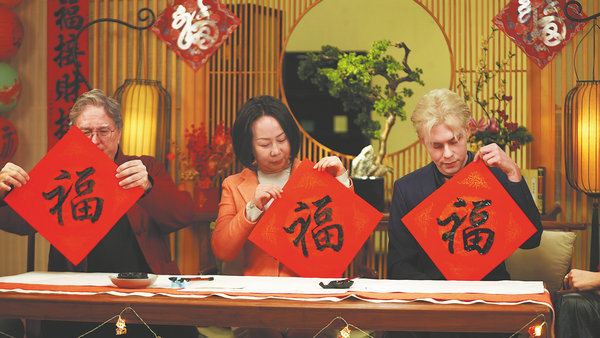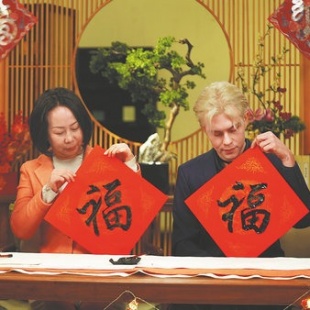A truly global celebration
Spring Festival's UNESCO recognition maps its position as a planetary jamboree that comes from China but now formally belongs to our shared world, Erik Nilsson reports.


It's official: China's Spring Festival belongs to the world. The country and planet are poised to welcome the Year of the Snake, weeks after UNESCO inscribed "Spring Festival, social practices of the Chinese people in celebration of their traditional new year", on the Representative List of the Intangible Cultural Heritage of Humanity.
"It's not just about Chinese people. It's for everyone," says Communication University of China's dean of the School of International Studies Wen Chunying.
"It's not just in China. It's all over the world. We celebrate the coming of the new year with people all over the world. We celebrate a new beginning and embrace the joy of life and sharing fun."
The professor and Fulbright scholar recently joined an Embracing Cultures salon organized by China Daily. She explored Spring Festival's meaning in today's world with US citizen David Moser, associate professor at Beijing's Capital Normal University; Russian Kirill Kravtsov, a postgraduate student from the School of Journalism and Communication at Peking University in Beijing; and two China Daily co-hosts.
Transforming traditions
They examined the past, present and future of the festival as it has continued to unfold across four millennia, and as technology and globalization are accelerating its evolution.
Participants traced its roots from a mostly agricultural local jubilee to a universal global celebration. They considered how such distinctive Chinese features as crackling fireworks, omnipresent red and dumpling dinners are embedded within such human universals as annual homecomings, family reunions and festive feasts.
For example, innovation and internationalization mean more of the hongbao (red envelopes containing cash) that elders have given youth for centuries today take the form of digital packets sent as mobile payments on social media platforms like WeChat. And e-commerce is transforming the ways people shop for the reunion banquets that are arguably the highlights of the festival. For instance, online shopping means more dishes and drinks from other parts of the country and world are appearing on tabletops during the celebration. Think mutton from northern China's Inner Mongolia washed down with French wine alongside local delicacies in the home of a family from southern China's Fujian province, all ordered from Taobao and Meituan.
People used to have to travel and spend perhaps days visiting and perusing markets, especially in rural areas, to put together more basic spreads, Kravtsov points out.
"That could be very, very complicated," he says. "But now, you can just open your phone and buy something online. That's very convenient."
Wen recalls that as a student she would have to make expensive long-distance phone calls to family and friends if she couldn't get home for the festival.
"But now, I can just fire up a WeChat video call and have a 'cloud reunion' on my phone. And no more paper cards, either. We make very personalized video messages to share our blessings. That's a really cool thing."
Moser says he usually visits his in-laws in Hebei province but will instead talk with them via video call this year, when he joins his wife, who's working in Bangkok over the holiday.
"We will have a WeChat call where we're all looking at each other and everyone is talking. So, we can kind of be together in a virtual space, even though we can't be in actual space. So, that's good," Moser says.
"The core values are the same, and it's a way of continuing. It's a way of doing the same thing but with new tools," he says.
"Sometimes, there's good, and there's bad. With technology comes greater access. But then, you lose something."





































